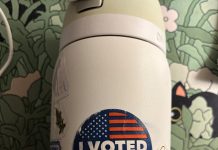Kelsey Knorp
National Beat Reporter
With considerably more hostility than viewers saw in previous Democratic debates, Sunday night saw presidential frontrunners Hillary Clinton and Sen. Bernie Sanders trade their last jabs before Feb. 1, when the Iowa caucuses will kick off state primary elections.
Of course, former Maryland Governor Martin O’Malley shared the stage with the two poll leaders as well, despite his two percent national polling average and five percent average in Iowa, according to data firm RealClearPolitics. Sanders, on the other hand, has seen surges in his ratings as of late, with recent data placing him just four points behind Clinton in Iowa and almost seven points ahead of the former Secretary of State in New Hampshire, whose primary will take place just six days after Iowa’s.
Though he’s made national headway as well, the latest polls indicate that Sanders’ national average still falls almost 13 points short of Clinton’s. The senator’s steady advances in the ranks coincided with a substantial decline in Clinton’s national ratings — which in recent days have seen a slight upturn — to shrink, if not close, the longstanding gap in popularity between the two candidates.
Tensions between the two were manifested in measured attacks from both camps Sunday night, each delivered with a fierce sense of rivalry that had previously been confined to the GOP debates.
Clinton came out swinging with criticism of Sanders’s voting record on gun control issues, which have come to the forefront of national debate following President Obama’s recent executive actions. She pointed to his five votes against versions of the Brady Handgun Violence Prevention Act, or the Brady bill, that included mandatory waiting periods — ranging from three to seven days as the bill underwent revision — for gun purchases, as well as his vote in favor of the 2005 act that protects gun manufacturers and sellers from civil liability should a third party use their products for criminal or otherwise unlawful purposes. Sanders has since reversed his position on the latter legislation.
Sanders stood by his usual claim that he voted against Brady because he has always favored “instant” background checks — which would require gun sellers to call a national hotline at the FBI to verify a customer’s lack of criminal record — instead of the waiting periods consistently written into the bill. In 1993, he joined the NRA in backing a proposed amendment that would instate such a policy, though the technology to enforce it did not exist at the time.
Three other votes — one against funding for gun research, one to permit gun carrying in national parks and one permitting guns in checked baggage on Amtrak — also made it into Clinton’s laundry list of condemnations.
“This should not be a political issue,” Sanders said. “What we should be doing is working together … We are going to re-look at [Brady] and I will support stronger provisions.”
Health care also proved a cause for dispute as the night wore on. Earlier that day, Sanders released his $1.38 trillion-a-year single-payer plan for universal care, which in large part would be covered by new tax brackets targeting high earners. Those with annual income in excess of $250,000 would be taxed at a rate of 37 percent, while those who earn over $10 million would be subject to a 52 percent rate. In addition, Americans would be expected to pay a 2.2 percent health care premium based on their federal income taxes, and employers would cover a 6.2 percent payroll tax.
On the debate stage, Clinton took a line of attack that cast Sanders as opposed to Obama’s Affordable Care Act, which she promised to “defend and build on” as president.
“Now, there are things we can do to improve it,” she said, “but to tear it up and start over again, pushing our country back into that kind of a contentious debate, I think is the wrong direction.”
Sanders called Clinton’s claims “nonsense,” but did point out that while, according to Clinton, 19 million Americans have been covered under Obamacare (fact checkers have since estimated that figure at more around 17.5 million), 29 million remain uninsured. His plan is essentially a crusade against the private sector to stop what he sees as exploitation by insurance firms and large pharmaceutical companies.
When moderators shifted the topic to Wall Street, Sanders wasted no time slamming Clinton for accepting sizable campaign contributions and personal speaking fees from banks. He promised to introduce legislation reminiscent of the Glass-Steagall Act, which until 1999 restricted affiliation between commercial banks and securities firms.
Clinton took the affront as a slight to the president by virtue of his own campaign finance record and, in keeping with a trend that has characterized much of her campaign, backed Obama and his 2010 Dodd-Frank Act, which streamlined regulation of financial institutions, established new rules about executive pay and corporate governance, and closed loopholes that contributed to the 2008 recession.
“The Republicans want to give [banks] more power, and repeal Dodd-Frank,” Clinton said. “That’s what we need to stop.”
Though O’Malley’s low poll standing limited his allotted speaking time, he held his ground throughout the debate and delivered his arguments with clarity, even when he had to fight for attention from moderators.
“We’re on the threshold of a new era of American progress,” O’Malley said in his closing remarks, “and I believe we have only need to join forces together and cross that threshold into a new era of American prosperity.”












